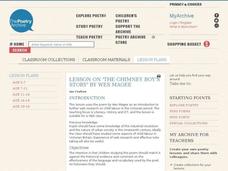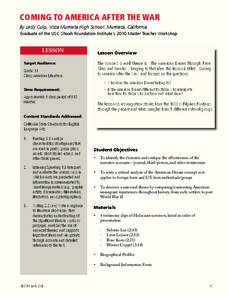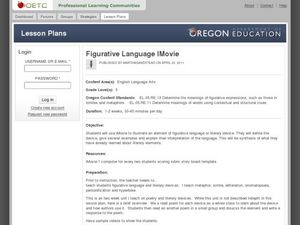Curated OER
Jazz In America - Lesson Plan 8
Fifth graders explore the current jazz scene and how it reflects American culture. They listen to jazz recordings of current artists and speculate on which direction jazz is likely heading.
Curated OER
Jazz In America - Lesson Plan 6
Fifth graders explore cool jazz and how it reflected American culture in the 1940's and 1950's.
Curated OER
Important Arkansas People
Famous people in the history of Arkansas are the focus of a history lesson for kindergartners. Pupils identify important Arkansas citizens, such as President Bill Clinton. They create an illustrated poem that features some of the...
Curated OER
We of the Sea: Tribal Native American Stories
A video featuring members of Oregon’s Astoria Native American fishing community launches a study of the oral tradition of poetry, and how traditions are passed down within different cultures. Activities, assessments, extensions and...
Curated OER
Modern Minstrelsy: Exploring Racist Stereotypes in Literature and Life
Satires may be designed to expose a bias to ridicule but if misunderstood can they reinforce that bias? Langston Hughes poem, “Minstrel Man” opens a discussion of racist stereotypes, the minstrel tradition, and the musical, “The...
Curated OER
Look in the Mythic Mirror: I've Got Rhythm!
Learners explore the relationships between music, poetry, and visual art. Using the story of Orpheus and Eurydice, pupils develop an awareness of the compositional elements of the Classical style, and the aesthetic effects of those...
EngageNY
Developing Reading Fluency: Criteria for Reading Aloud
Third graders develop their reading superpowers in a lesson plan on fluency. After first listening to an audio recording or teacher read aloud, the class works together identifying criteria for fluent reading, focusing on phrasing, rate,...
Alabama Learning Exchange
J. Alfred Hyperbolizes
Mermaids will sing to your class members as they engage in an activity related to T.S. Eliot's famous dramatic interior monologue. After engaging in a socratic seminar about literary devices in the poem, individuals choose one...
Curated OER
Emotion in Art & Poetry
Fourth graders are introduced to famous works of art and begin to discuss the artist's work. Use art to explain and reflect their own emotions. The write about feelings in a work of art and make connections between art and other...
Facing History and Ourselves
What Shapes Your Identity?
Sixth graders explore their individual identities. For this personal identity lesson, 6th graders write biopoems using the provided template. Students share their poems and respond to the poetry shared.
Alabama Learning Exchange
President's Day for Special Education/Early Elementary
Students investigate how both Abraham Lincoln and George Washington displayed the trait of honesty. They listen to read alouds of class books and poems that address both the lives of these men and the trait of honesty. They use a graphic...
Curated OER
My Secret War: Lesson 5
Fifth graders determine how freedom comes with rights and responsibilities through literature and poetry about World War II. In this World War II lesson, 5th graders use the letters in the word "infamy" to write an acrostic poem. They...
Curated OER
What Is Haiku
Students engage in a lesson that is concerned with the study of poetry while focusing on Haiku as a format. They practice reading a variety of different pieces of literature in order to increase exposure. Students discuss the author's...
Curated OER
WHAT DO BEARS EAT AND HOW DO THEY WALK?
Students listen to the poem "Five Bears" read aloud several times, and study what bears eat by naming the foods (mentioned in the poem) out loud. They draw a picture to illustrate one line of the poem and practice choral reading.
Curated OER
“And Still I Rise” Proud Black Women
Students examine the experiences of African American women. In this poetry lesson, students use their literary analysis skills to compare the poetry of Maya Angelou to rap music performed by Queen Latifah and Lauryn Hill.
Curated OER
Gyotaku Lesson Plan
Students examine and discuss the history and process of Gyotaku, or fish prints. They view images of Gyotaku, create a fish print, and write a haiku.
Roy Rosenzweig Center for History and New Media
Patriots or Traitors - Point of View in the War for Independence
Patriots or traitors? Class members analyze images that present widely differing views of the Boston Tea Party, identifying the point of view of the image, the propaganda devices used, and the intended audience.
Curated OER
Hermeneutics: Teaching Students Author's Purpose
Your developing literary critics discuss 'perspective' and discuss how the same occurence can be interpreted by two different people in two different ways. They read Ryszard Kapuscinski's untitled poem, infer meaning of the poem, and...
Curated OER
Lesson on 'The Chimney Boy's Story' by Wes Magee
Wes Magee's poem "The Chimney Boy's Story" about chimney sweeps/climbing boys is used as an introduction to a activity that asks groups to research child labor in Victorian Britain.
Curated OER
The Star-Spangled Banner
Get your kids moving as they learn about the history of the United States National Anthem. Scholars examine the War of 1812, Francis Scott Key, and the meaning behind The Star Spangled Banner as they listen to an 18-minute...
Curated OER
Picture Lincoln
Students analyze Alexander Gardner's photograph of Abraham Lincoln and complete related activities. In this Abraham Lincoln lesson, students describe Abraham Lincoln as he is presented in Gardner's photograph. Students read a biography...
Curated OER
What Is CLIVAR and EPIC?
Students conduct Internet research to analyze climatic conditions. They answer questions by conducting Internet research about CLIVAR and EPIC and write an essay about why climate research is an international issue.
University of Southern California
Coming to America After the War
As part of their exploration of the American dream, class members examine primary source materials to compare immigrant experiences of those arriving early in our country's history to those arriving in the US after World War...
Curated OER
Figurative Language iMovie
In order to understand figurative language, learners read 5 poems, each exemplifying a different literary device. They discuss and write responses to each poem. They then choose one literary device which they will use as the basis...






















